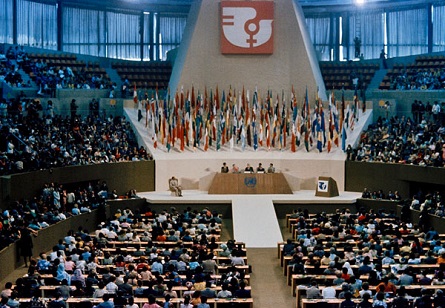Georgia presents report on discrimination against women at global convention

Domestic violence, abduction of girls, selective abortion and other forms of discrimination against women in Georgia is being discussed by Georgian and international officials at a UN Convention in Switzerland today.
Two periodic reports on the Georgian Government’s compliance with requirements of the UN Convention on Elimination of All Forms of Discrimination against Women are being presented and discussed at a public session today.
Leader of the Gender Equality Council Manana Kobakhidze and other Council members and Georgian Parliament members Guguli Magradze and Viktor Dolidze are in Geneva to attend the discussions.
At the session Kobakhidze is expected to take the floor and read a report on the reforms recently introduced in Georgia and the challenges the country continues to face in terms of ongoing discrimination against women.
Meanwhile, the Committee on the Elimination of Discrimination against Women met with representatives of Georgiannon-governmental organisations(NGOs) and a national human rights institutionyesterday to learn about the current situation of women in Georgia.
Representatives of NGOs in Georgia drew attention to high abuse rates, selective abortions and how female drug users were ousted from their communities and regarded as social outcasts. Ineffectivesupportand a lack of state resources led to ineffective protection of the rights of women, the NGOs said.
Deputy Public Defender of Georgia Paata Beltadze said effective implementation of protective measures for victims of domestic violence remained problematic, and expressed concern about the growing number of cases of femicide, early marriages and abduction of girls.
He urged the Interior Ministry of Georgia to establish urgent strategies to address these and other issues and provide adequate protection.
Beltadzesaid a key challenge for gender equality was the low level of political participation of women– only 21 percent of people in Parliament are female.
Lack of attention and action by authorities to address the practice of early marriages and abduction of girls for the purpose of marriage, particularly in Azerbaijani ethnic communities, and exchange of young girls for money or cattle, was alarming, he said.
On a positive note, Beltadzewelcomed the May 2014 adoption of a law to eliminate of all forms of discrimination and the signing of the Istanbul Convention.
Despite these improvements, NGO representatives said many improvements still needed to be made.
A speaker for Union Sapari drew attention to the feminisation of poverty and said irrespective of legal norms, no sanctions were imposed for sexual harassment of women.When referring to theharsh discriminationof lesbian, gay, bisexual and transgender people, the speaker said the state was"unwilling to implement non-discrimination measures”.
A spokesperson from Hera XXI spoke about child marriage, access to abortion and the practice of sex selective abortion.
A representative from Harm Reduction Network highlighted several issuesrelating to female drug users and said women who used drugs were considered "outcasts” and were often pushed away from their families, communities and general society.
The spokesperson said the rate of violence against women who used drugs was extremely high, where 80 percent of female drug users were victims of some form of violence.
Women’s Information Centre said ineffective support and lack ofstate resources led to ineffective protection of the rights of women. The agency’s spokesperson said were no legal provisions that guaranteed political participation of women and representation in decision-making. Currently the rate of female participation in positions of power was "extremely low”.
The Convention on the Elimination of All Forms of Discrimination against Women, adopted in 1979 by the UN General Assembly, is often described as an international bill of rights for women. Consisting of a preamble and 30 articles, it defines what constitutes discrimination against women and set up an agenda for national action to end such discrimination.
 Tweet
Tweet  Share
Share